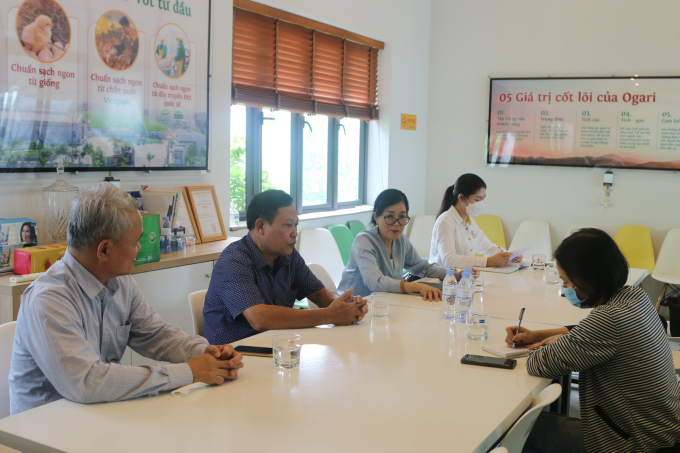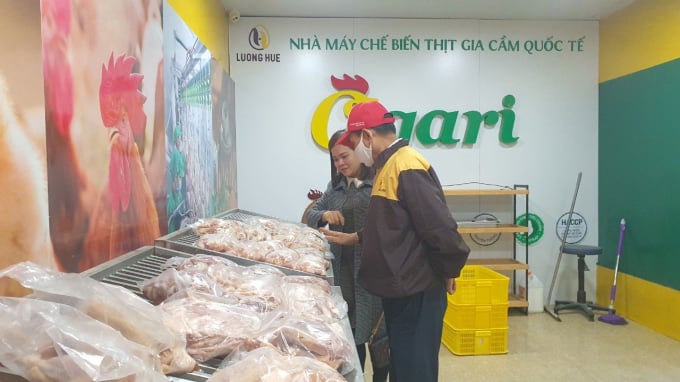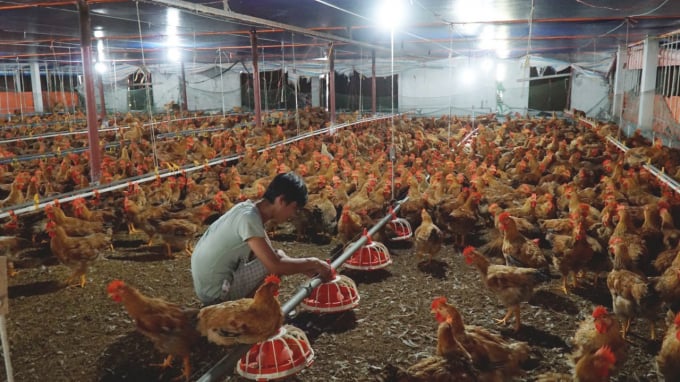June 1, 2025 | 21:46 GMT +7
June 1, 2025 | 21:46 GMT +7
Hotline: 0913.378.918
June 1, 2025 | 21:46 GMT +7
Hotline: 0913.378.918
One of the enterprises selected by the National Agricultural Extension Center (NAEC) to cooperate in the livestock field from 2022 to 2024 is Luong Hue Poultry Breeding Joint Stock Company (Luong Hue Co.) in Hai Phong.
This is also almost the first time that a livestock enterprise in the North is chosen to collaborate with the NAEC to implement a project related to poultry production with the expectation that it will assess the role of businesses when it comes to poultry farming projects.
On the other hand, businesses can gain an opportunity to popularize good practices to a large number of people, and be the driving force that opens a wider path for poultry consumption.
According to Dr. Ha Thuy Hanh, Deputy Director of the National Agricultural Extension Center, biosafety breeding was a solution that not only helped people raise livestock well but also ensured environmental protection, reduced costs and controlled diseases.

The product consumption association is an indispensable solution today, aiming toward more efficient product consumption as well as better disease prevention and control. Photo: Dinh Muoi.
Since the beginning of 2022 NAEC has studied programs and projects related to the livestock sector to deploy in localities. The main goal is to increase production linkage between enterprises and livestock households.
NAEC hopes to help the livestock sector access to advanced technical procedures which ensure biosecurity, product output as well as issues concerning quality and food safety. Businesses will clearly show their role in leading livestock development and production linkage to create products that ensure improve quality and product value.
However, Dr. Hanh also emphasizes the importance of implementing the projects effectively. Enterprises need to proactively take action within the correct procedures, and be open and transparent when choosing production points and households.

“Luong Hue Co. is expected to be the leading ship to open the output for poultry products.” - Dr. Ha Thuy Hanh, Deputy Director of the National Agricultural Extension Center. Photo: Dinh Muoi.
Projects must create a chain link effect and ensure biosecurity. Parties must be able to evaluate how the farm size changes before and after participating in the project, and how it creates a positive impact on the industry.
At the end of the project, there must be more OCOP products from husbandry in addition to the products that businesses currently have. The production to consumption chain has to experience marked changes considering the time people joined the project.
“Luong Hue Co. is expected to be the leading ship to open the output for poultry products. Through the project, we hope to evaluate the role of businesses when participating in projects and the effective changes they will bring. We hope that through this project, Luong Hue Co. will be able to expand VietGap production models, add more OCOP poultry products apart from underwriting of products, helping farmers improve in terms of economic, social and environmental efficiency,” said Dr. Ha.
In fact, many years ago, when the association for agricultural product consumption was still limited, farmers basically could not take the risk to make big investments in the chicken raising field, except for some processing establishments. For small livestock farmers that decided to make a big investment, their livestock had either been swept away by epidemics or been forced to dump prices and then went bankrupt.
After the concept of production linkage and agro-product underwriting has been developed, problems concerning disease outbreaks or the "good harvest, bad price" situation of poultry farmers were partly solved.

For many years Luong Hue Co. has associated with many farms in Hai Phong to raise chickens according to VietGap standard model to help people raise safer products and attain a more stable price. Photo: Dinh Muoi.
Luong Hue Co. is currently associated with 40-50 farms, of which the smallest farm has approximately 6,000 cows, and the largest has approximately 30,000. The farms are mainly located in Hai Phong.
Regarding industrial chickens, this enterprise has created linkage with a number of joint venture farming companies in other provinces and cities such as Thai Nguyen, Phu Tho, Lao Cai, and Yen Bai.
When participating in the production link chain, the breeder only needs to follow the right techniques per the enterprise's request, and the enterprise will be responsible for providing standard chicken breeds, bran, and techniques and purchasing the final products.
Translated by Samuel Pham

(VAN) Several scientists and farmers are experimenting with soil treatment in some key durian-growing regions such as Cai Lay (Tien Giang), Dak Song, Gia Nghia, and Dak R’lap (Dak Nong).
/2025/05/25/4127-3-073637_820.jpg)
(VAN) Thanks to the promotion from an FAO-implemented project, vegetable production in greenhouses in Moc Chau has seen strong development, from 1.5 hectares in 2021 to nearly 50 hectares in 2024.

(VAN) FAO has recently supported USD 140,000 to implement the project 'Risk mitigation human-animal interface risks through disease control initiatives in pig farming.'

(VAN) The People's Committee of Tra Vinh province has approved an adjustment to the investment policy for the Green Hydrogen Plant project, increasing its area to approximately 52.76 hectares.
![Reducing emissions from rice fields: [2] Farmers’ commitment to the soil](https://t.ex-cdn.com/nongnghiepmoitruong.vn/608w/files/news/2025/05/05/dsc08881jpg-nongnghiep-140632.jpg)
(VAN) Clean rice cultivation model in Thuong Tan commune, Bac Tan Uyen district, is assisting local residents in achieving sustainable agriculture by substantially reducing costs, increasing productivity, and protecting the environment.

(VAN) At the conference to disseminate Resolution No. 68, AgriS introduced its digital agricultural ecosystem and reaffirmed its commitment to accompanying the Government in promoting private sector development and sustainable agriculture.

(VAN) 'Blue Ocean - Blue Foods' initiative is designed to restore marine ecosystems and establish sustainable livelihoods for local communities by cultivating a minimum of 1,000 hectares of cottonii seaweed in the first three years.